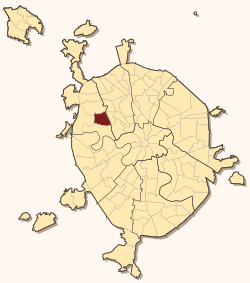Shchukino District
| Shchukino District район Щукино (Russian) |
|
|---|---|
 Location of Shchukino District on the map of Moscow |
|
| Coordinates: 55°48′08″N 37°28′03″E / 55.80222°N 37.46750°ECoordinates: 55°48′08″N 37°28′03″E / 55.80222°N 37.46750°E | |
 Alye Parusa residential buildings in Shchukino District |
|
|
|
|
| Location | |
| Country | Russia |
| Federal subject | Moscow |
| Statistics | |
| Area | 7.68 km2 (2.97 sq mi) |
| Population (2010 Census) | 105,665 inhabitants |
| • Urban | 100% |
| • Rural | 0% |
| Density | 13,758.46/km2 (35,634.2/sq mi) |
| Time zone | MSK (UTC+03:00) |
| Official website | |
| on | |
Shchukino District (Russian: райо́н Щу́кино) is an administrative district (raion) of North-Western Administrative Okrug, and one of the 125 administrative districts of the federal city of Moscow, Russia. It borders with Pokrovskoye-Streshnevo District in the south, Strogino District in the east, Khoroshevo-Mnevniki District in the north, and in the west there is the boundary between North-Western and Northern Administrative Okrugs. The area of the district is 7.68 square kilometers (2.97 sq mi). Population: 105,665 (2010 Census);89,454 (2002 Census).
In 1415, Vasily I of the Grand Duchy of Moscow built the village of Shchukino to the east of the Moskva River.
1945-1991
After the war and before the beginning of mass building of the 1960s there has continued the residential construction in the Oktyabrskoye Pole district (already at 5 floors) and a development of scientific establishments. Near the Kurchatov Institute there had been originated the A.Bochvar Institute of Inorganic Materials. The "journey of two academics" (Maximov street) has divided two "nuclear" territories. Nearby, there has set the stage of the Research Institute of Instrumentation on the Raspletin street and at the north, the Institute of Virology and Epidemiology was constructed on a Gamalei street. There were built cottage towns for management of the institutes on the Rogov street, Pehotnaya street and Aviacionnaya street. Most of them were demolished in the early 1980s. The Hospital № 6 was built for professors and management who worked on the atomic projects at the Novoschukinskaya street. Separate "Stalinist" houses have appeared on the Jivopisnaya street, the Kurchatov Square, the Zhadova Square and on adjacent streets.
...
Wikipedia

